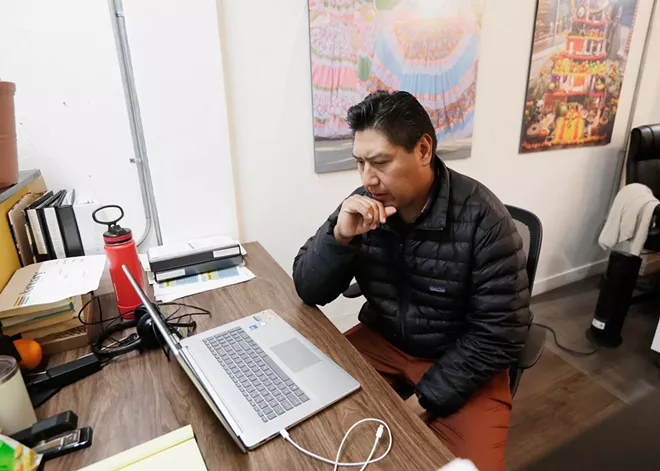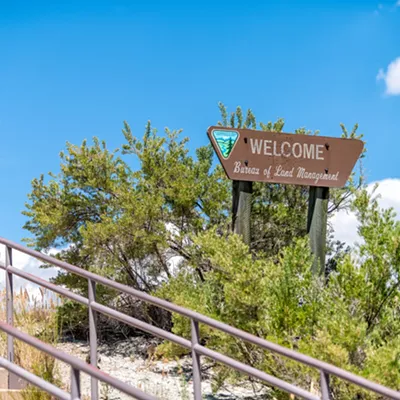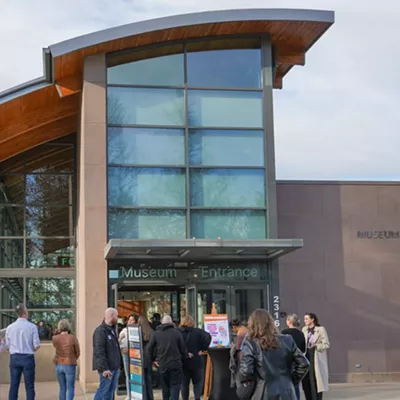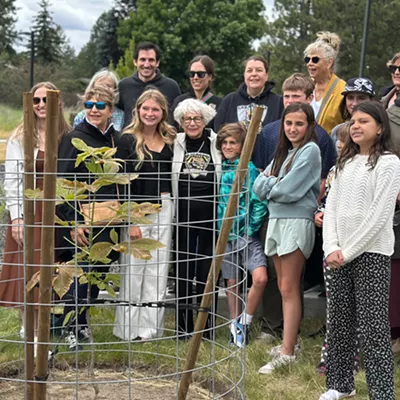
You park your car before you go into work, but as soon as you're about to enter the building, U.S. Border Patrol or Immigration and Customs Enforcement, or ICE, agents approach you to ask if you're "legal" and have proof of citizenship.
At home, you witness an unmarked vehicle nearly hit your parked car. When you go out to assess potential damage, you discover the culprit is a federal agent who tricked you into leaving your home to question your residency status and anyone else in your home.
You visit the local park to walk your dog. As you walk back to your vehicle, you're approached by officers armed with rifles who don't identify themselves before asking for your identification or "papers" while telling you to get your dog under control.
Spokane residents have reported these exact scenarios in recent days, but many are unprepared to document or record the entirety of the events because of how unexpected these interactions are. They're just some of the recent ICE sightings across the state.
Currently, President Donald Trump, who campaigned on immigration issues, has released a flurry of executive orders targeting immigrants in the United States. His goal is to deport an estimated 12 million or more undocumented immigrants, primarily from Mexico, El Salvador, India and Guatemala.
Trump has issued executive orders seeking to end birthright citizenship (which has been challenged in court as unconstitutional) and to make it easier for state and local police officers to enforce federal immigration laws. Trump's orders have also threatened to withhold federal funding from states and municipalities operating as sanctuaries for immigrants.
States like Washington have led the charge in challenging unconstitutional laws presented during Trump's current and previous administrations. The Keep Washington Working Act, the Health Insurance Portability and Accountability Act, or HIPAA, and the Family Separation Rapid Response Team recently created by Gov. Bob Ferguson are all obstacles to Trump's mass deportation plans.
Organizations like Latinos en Spokane are also mobilizing support for undocumented immigrants, and local law enforcement agencies have confirmed their respect for state protections. Local hospitals, schools and churches have reaffirmed their commitment to protecting the vulnerable under the laws that govern Washington.
Here's some more context on those policies and what's happening in Idaho.
KEEP WASHINGTON WORKING
The Keep Washington Working Act, enacted in 2019, established a statewide policy that bolsters Washington's immigrant economy and acknowledges the contributions of immigrants to the workforce. The policy prevents local law enforcement from diverting resources to help investigate and support federal agents with immigration detainments.
Washington State Patrol, county sheriff's offices, police departments, the state Department of Corrections and school resource officers are all prohibited from collecting immigration status information, detaining Washingtonians to determine their immigration status or entering into contracts with immigration agencies to detain immigrants.
State agencies, including the Department of Labor, are obligated to limit the collection and dissemination of personal data, particularly with immigration entities, and to deliver services irrespective of immigration status.
Spokane County Sheriff John Nowels says his department and other law enforcement agencies in Washington don't have the authority to enforce civil federal immigration law, and state policy prevents them from doing so.
"I can't arrest somebody for being in this country illegally. I can't detain someone lawfully for being in this country illegally," Nowels says, "We don't have the authority to do it, and so we don't."
However, Nowels says law enforcement officers are allowed to identify someone's residency status if they're being investigated for a crime.
But to enforce federal immigration laws, his officers would need to be specially deputized by federal authorities. Special deputation grants federal law enforcement authority to individuals. The U.S. Marshals Service is one federal agency that uses special deputation.
ICE's law enforcement volunteer program allows federal agents to delegate authority to participating state and local law enforcement officers to perform specified immigration officer functions under the agency's direction and oversight.
However, Nowels says he doesn't have enough resources to help federal agents and would need to evaluate the impacts on the ability to address local crimes within Spokane County if federal agents were to attempt to use special deputation.
"I don't have the manpower if we have to deal with that stuff," Nowels says. "We have to spend our time enforcing those state laws and keeping our community safe."
LOCAL ENFORCEMENT
Jorge Guerrero is an immigration and environmental justice organizer for Latinos en Spokane, a grassroots nonprofit that began in 2016 with a primary focus on immigration advocacy.
Guerrero says the nonprofit's legal department, Poder Legal, has inquired about different immigrants being picked up within Washington and taken to Idaho, where law enforcement agencies will hold detainees.
"They are also being taken out of Washington because our state has the Keep Washington Working Act, which is more favorable towards our community than Idaho," Guerrero says. "So the people that are right now being detained are taken to Idaho."
Over the past year, Kootenai County Sheriff Bob Norris has publicly opposed the idea of giving undocumented immigrants driver's licenses, and he asked the Idaho Legislature to strengthen laws against undocumented immigrants.
In August 2024, Norris said in a press release that the "Kootenai County Sheriff's Office has an excellent working relationship with U.S. Immigration and Customs Enforcement (ICE) to remove criminal aliens from our county."
Kootenai County sheriff's Lt. Jeff Howard says the department has an agreement with the U.S. Marshals Service to hold federal detainees. He says many federal detainees will eventually go to ICE's Tacoma Northwest Detention Center.
As of Jan. 31, there were 33 individuals being held by U.S. Border Patrol in the Kootenai County Jail, including 23 new detainees since Jan. 20, when President Trump was sworn into office.
Howard says the Kootenai County Jail is reimbursed $112 per day for each federal detainee held in the county jail, which he notes does not fully cover the costs to the county. When asked about the complete costs, Kootenai County officials were uncertain of the per diem expenses per detainee.
Many Idaho lawmakers share Norris' stance toward undocumented immigrants. House Bill 11, introduced by state Rep. Jaron Crane, R-Nampa, would allow local police to check peoples' documentation status.
ICE ACTIVITY
Many reports on social media have claimed to spot ICE agents throughout Washington, including in Seattle, Toppenish, Sunnyside and other locations as confirmed by the Washington Immigrant Solidarity Network, or WAISN. Spokane is not on WAISN's list of confirmed sightings.
Immigrant organizations around the country are working to confirm ICE activity and separate valid reports from false ones. This is a challenge because of how fast information travels on social media, but WAISN says it's important to "spread power, not panic" and to only share verified, documented reports.
Guerrero believes that many posts on social media have good intentions of getting the information out there to those who are vulnerable.
"I think it's coming from a good heart for the ones that are posting and trying to create awareness of where those checkpoints are happening," Guerrero says.
WAISN's deportation defense hotline (1-844-724-3737) will post on social media if they confirm reports of immigration enforcement raids. WAISN's rapid response team members collaborate with witnesses and verify the identities of ICE agents in unmarked vehicles using recordings.
In Spokane earlier this week, the Inlander was told about officers approaching someone at a park to ask for their identification or "papers," with some officers reportedly wearing civilian clothing and driving unmarked vehicles. The individual asked not to be named for fear of retribution. There is also a video making the rounds on local social media of U.S. Border Patrol agents in unmarked vehicles questioning individuals about citizenship at their house in Spokane.
From what he's heard, Guerrero says that federal agents are watching individuals go to work and studying their whereabouts. He says that some people may be picked up before they can even enter the door of their workplace.
COMMUNITY SUPPORT
Even with the uncertainty of what is confirmed or merely rumored to be happening, many community leaders have made it clear that there are still legal protections in place for undocumented immigrants.
In January, Gov. Ferguson signed an executive order to create the Family Separation Rapid Response Team. The task force includes Washington's Department of Children, Youth and Families, State Patrol, Office of Refugee and Immigrant Assistance, Attorney General's Office, and representatives of the Governor's Office, who will develop policies to help children with mixed-status families through potential separation from their parents or caregivers.
Spokane Public Schools follows state guidelines from the Office of the Superintendent of Public Instruction, which aims to protect students by denying engagement with federal agents.
"State law prohibits Washington's public schools from initiating engagement with immigration authorities for the purpose of sharing student information and underlines that public schools must have policies in place for appropriately responding when immigration enforcement authorities visit a school campus," district spokesman Ryan Lancaster says by email.
Nowels says that no one in his department is actively asking for proof of residency, and if they do, they will have to explain themselves for violating state law. He wants to reassure immigrants who are victims of a crime that they shouldn't fear local law enforcement.
Even with the many legal protections in Washington, Latinos en Spokane organizer Jorge Guerrero wants immigrants and employers to know their rights. Latinos en Spokane is organizing workshops and can answer questions.
Guerrero says concerned business owners can ask questions when agents show up, and must be assertive and clarify that agents aren't allowed in private spaces without a signed judicial warrant.
"Become like a barrier and say, 'Hey, do you have a warrant, and who are you looking for?' And if they don't have anything like that," Guerrero says they can ask them to leave.
WAISN's advice for how to address ICE includes:
Don't open the door, but communicate through a window or closed door. Agents can only enter your home with a search warrant issued by a court and signed by a judge.
Remain silent and don't sign any documents. You have the right to remain silent but can say that you will not answer questions or sign anything without an attorney present.
Don't consent to a warrantless search. You don't have to give ICE permission to enter your house or search your car unless they have a judicial search warrant.
Take photos, videos and write down details. Inform agents you will exercise your right to record.
— VICTOR CORRAL MARTINEZ
"Their immigration status is not a question we're going to be asking if they're a victim of a crime, we're not, by course of conduct, going to ask what your immigration status is," Nowels says.
Providence, which owns Sacred Heart Medical Center and Holy Family Hospital, says health care is a fundamental human right regardless of socioeconomic or legal status. Providence spokeswoman Beth Hegde says medical facilities are a sanctuary for all, where individuals can be treated with compassion and respect.
"We will continue to follow state and federal laws," Hegde says. "Enforcement agents do not have access to patient care areas and may not conduct enforcement activity on our campuses. We do not report our patients' personal information, including legal status, to enforcement authorities."
Kevin Maloney, spokesman for MultiCare Inland Northwest (including Deaconess Hospital, Rockwood clinics and Valley Hospital), says no officers can enter private areas within MultiCare facilities without a judicial warrant. He affirms the HIPAA doesn't allow immigration status to be reported to any government or private entity by MultiCare.
"The laws governing patient privacy and the protection of personal health information remain the law of the land," Maloney says by email.
Jean Hill, executive director of the Washington State Catholic Conference, a public policy advocacy group representing the Dioceses of Washington, says that churches are not public property. A signed judicial warrant must be obtained before law enforcement can enter a Catholic church.
Latinos en Spokane has drafted a resolution for the Spokane City Council that would allocate funding for legal immigration defensive services and educate city employees on the Keep Washington Working Act.
In anticipation of the council voting on the resolution, Latinos en Spokane is organizing a rally for immigrant rights, which will occur outside City Hall before the 6 pm meeting begins on Feb. 10. ♦























